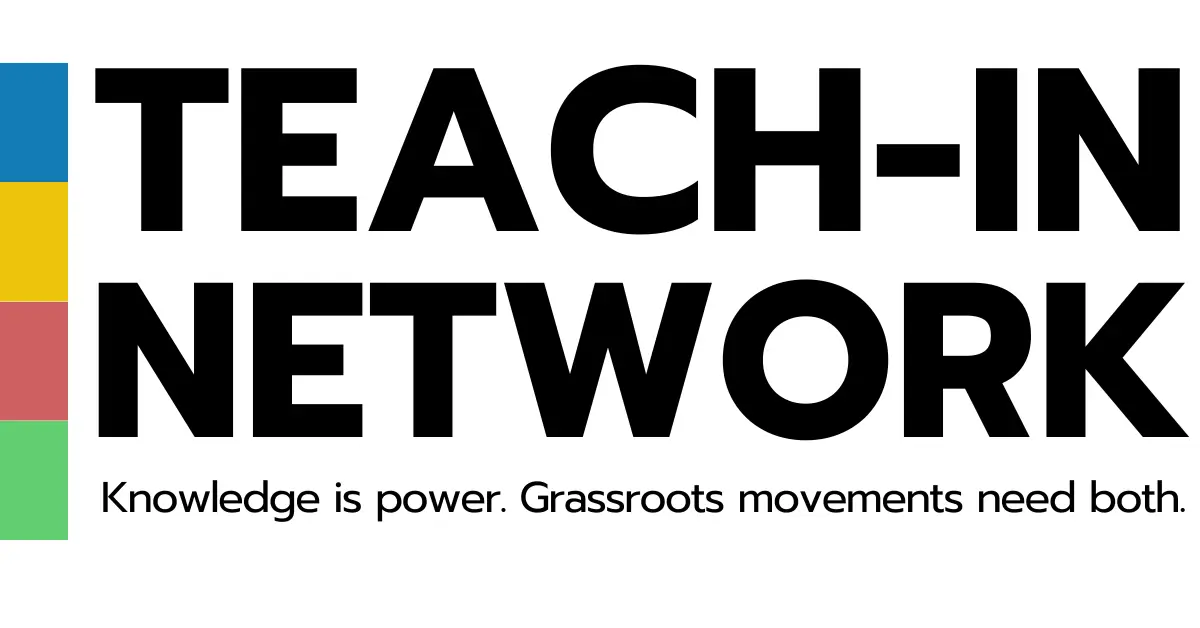Toolbox: Nuclear War and Nuclear Weapons
The speakers and educational resources in this toolbox will engage your group in conversations about nuclear proliferation, ICBMs, false alarms, nuclear winter and the relationship between nuclear weapons and climate change.

Primers and Presentations
Primer
This 6-Page primer includes the basics about nuclear war and nuclear weapons. Share a link to this document or print it for your group. Available here
If you’re hosting an in-person teach-in, organizers should plan to keep their attendees safe. This document can help you do that: Hosting a safe Teach-in
Presentation Slides
Mix-and-match presentation slides as you see fit. Not every slide or presentation works for every group. Cater the presentation to what is most useful to your group, club, or organization.
(instructions: Open the slides below and click File -> Make a Copy -> Entire Presentation to customize your own presentations.)
Resources
Guides
Guide: Uranium Atlas: Data & Facts about the Raw Material of the Nuclear Age
Guide: Primer on Foreign Policy | RootsAction
Guide: Racism, War & Nuclear Weapons | Twin Ports Campaign to Abolish Nuclear Weapons
Guide: Environmental Costs of Nukes | Twin Ports Campaign to Abolish Nuclear Weapons
Guide: Nukes: The Ultimate In Waste | Twin Ports Campaign to Abolish Nuclear Weapons
Infographics
Posters: Nuclear Literacy Project
Flyer: Nuclear Weapon Fallout Safety infographic from the CDC
Infographic: Atomic Bombing of Hiroshima, Encyclopedia Britannica
Infographic: U.S. Nuclear Inventory, Center for Arms Control and Non-Proliferation
Infographic: World Nuclear Inventory, Center for Arms Control and Non-Proliferation
Videos
Documentaries
Interviews and Conversations
Social media accounts
These accounts are useful for staying in-the-know on what’s actually happening in the world of nuclear war and nuclear weapons activism.
Twitter / X
- Defuse Nuclear War campaign | Twitter
- International Campaign to Abolish Nuclear Weapons (ICAN) | Twitter
- Hans Kristensen | Twitter
- Stephen Schwartz | Twitter
- Stephen Semler | Twitter
- Security Policy Reform Institute | Twitter
- Union of Concerned Scientists | Twitter
- Inkstick Media | Twitter
- Taylor Barnes | Twitter
- Massachusetts Peace Action (MAPA) | Twitter
- Emma Claire Foley | Twitter
- Norman Solomon | Twitter
- Progressive Hub | Twitter
- WILPF | Twitter
- Cynthia Lazaroff | Twitter
- RootsAction | Twitter
- Physicians for Social Responsibility | Twitter
- Nuclear Age Peace Foundation | Twitter
- Just Foreign Policy | Twitter
- Ben Friedman | Twitter
Articles
These articles are useful for kicking off conversations.
Nowhere to Hide: How Nuclear war would kill you — and almost everyone else.
The article from the Bulletin of the Atomic Scientists explores the catastrophic global consequences of a nuclear war, emphasizing that no place would be safe. It details the immediate effects of nuclear explosions, such as massive casualties and destruction, followed by long-term impacts like nuclear winter, which would drastically reduce global temperatures, disrupt agriculture, and lead to widespread famine. The article underscores the existential threat posed by nuclear weapons, highlighting the urgent need for disarmament and prevention of nuclear conflict to avoid unimaginable devastation.
Nuclear Winter Is Climate Change In Fast-Forward
A “limited” nuclear war could trigger a nuclear winter, causing global cooling, massive agricultural collapse, and the starvation of billions, while a full-scale nuclear war would be even more catastrophic. At the same time, climate change exacerbates tensions between nuclear-armed nations, increasing the risk of nuclear conflict. Activists are urged to address both issues, as nuclear winter represents a rapid and devastating escalation of the climate crisis.
Why Is There More Media Talk About Using Nuclear Weapons Than About Banning Them?
The Treaty on the Prohibition of Nuclear Weapons (TPNW) is a critical international agreement aiming to eliminate nuclear weapons, yet it has been largely ignored by media outlets. Adopted by 122 nations in 2017 and in force since 2021, the treaty offers a path toward a nuclear-free world, but nuclear-armed states, including the U.S., Russia, and China, have refused to participate. Despite increasing public concern over nuclear threats, media coverage rarely mentions the treaty, limiting public awareness and advocacy. Peace organizations emphasize the need for media attention to promote the TPNW and highlight the pressing danger of nuclear conflict, as well as the possibility of global disarmament.
The Threat of 1,000 Holocausts Puts Everything at Stake
The article by Norman Solomon underscores the grave and imminent danger of nuclear weapons, warning that the current geopolitical climate increases the risk of a catastrophic nuclear conflict. It critiques the lack of progress in global disarmament efforts and the modernization of nuclear arsenals by major powers, which heightens the threat of accidental or intentional use. The author calls for renewed public awareness and activism to pressure governments to adopt policies that prioritize peace and nuclear abolition. Emphasizing the moral and existential stakes, the article urges humanity to confront the reality of nuclear weapons and work collectively to prevent a potential nuclear holocaust that could annihilate civilization and the planet.
A Just-Released Watchdog Report Makes the Case for Eliminating Land-Based Nuclear Missiles
This article from the Quincy Institute discusses a newly released watchdog report advocating for the elimination of land-based nuclear missiles, known as intercontinental ballistic missiles (ICBMs). The report argues that ICBMs are increasingly obsolete, costly, and dangerously prone to accidental launches or miscalculations, which could trigger an unintended nuclear war. It highlights the financial burden of maintaining these systems, estimating hundreds of billions of dollars in projected costs, and suggests that retiring them would enhance national security by reducing risks without compromising deterrence. The article calls for policymakers to reconsider the role of ICBMs in U.S. nuclear strategy and to prioritize arms control measures that promote global stability and reduce the likelihood of nuclear conflict.
America’s Nuclear Missiles Make Its Citizens Less Safe
The Jacobin article critiques the U.S. reliance on intercontinental ballistic missiles (ICBMs), arguing that these weapons are not only exorbitantly expensive but also pose significant safety risks. It highlights concerns about the aging ICBM infrastructure, which increases the likelihood of accidents or malfunctions, and points out that these systems are vulnerable to cyberattacks and false alarms, raising the risk of unintended nuclear escalation. The article also emphasizes the immense financial costs of modernizing the ICBM fleet, which diverts resources from pressing domestic needs. By advocating for the elimination of ICBMs, the piece calls for a reevaluation of U.S. nuclear policy, urging a shift toward arms reduction and greater investment in diplomacy and global security to prevent nuclear catastrophe.
Daniel Ellsberg’s message to us, and to future generations
The article reflects on the legacy of Daniel Ellsberg, a whistleblower who exposed government secrets about the Vietnam War and nuclear dangers. It emphasizes his lifelong advocacy for transparency, peace, and nuclear disarmament, warning of the existential risks posed by nuclear weapons. Ellsberg’s message urges current and future generations to confront these threats, reduce nuclear arsenals, and prioritize global cooperation to prevent catastrophic conflict, underscoring the moral imperative to act before it’s too late.
Expert Speakers
Use the form below to gain access to expert speakers on nuclear war and nuclear weapons activism. See our full list of Expert Speakers here.

Hanieh Jodat Barnes
Gaza, Israel, and the Middle East; Nuclear War
Senior Partnership Coordinator at RootsAction, Strategist with Defuse Nuclear War, founder of Progressive Democrats of America Middle East Alliances. Former political strategist for Cori Bush and Nina Turner for Congress. Published author.

Norman Solomon
Gaza, Israel, and the Middle East; Nonviolent Activism; Nuclear War
National director of RootsAction.org and executive director of the Institute for Public Accuracy. Author of over a dozen books including 2023’s War Made Invisible: How America Hides the Human Toll of Its Military Machine, with a new afterword about the war on Gaza.













